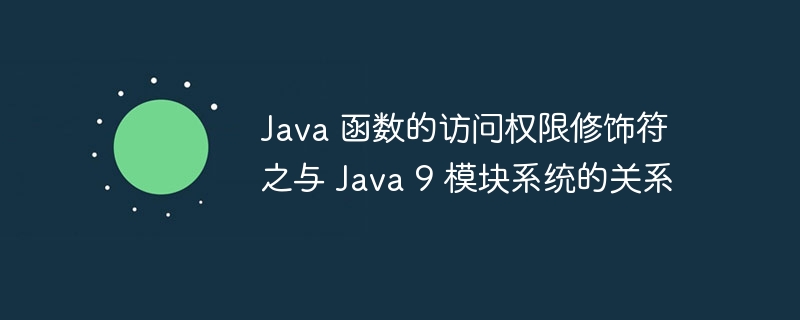How Java function access modifiers relate to the Java 9 module system
The Java 9 module system has changed the meaning of the access modifiers: the public modifier allows external module access; the protected modifier allows module access of the exported package; the default modifier restricts access to modules of the exported package; the private modifier only allows Declare access within the module.

The relationship between Java function access modifiers and the Java 9 module system
Java 9 introduced the module system, which is A new way to organize and package Java applications. The module system introduces new meaning to the existing access modifiers in the Java language (public, protected, default, and private).
Access modifiers
Access modifiers in Java specify which classes and packages can access the class, field, or method. The four access modifiers are explained as follows:
- public: Accessible to all classes and packages.
- protected: Accessible to all classes and all subclasses in the same package.
- default (also called package-private): Accessible only to classes in the same package.
- private: Accessible only to the class in which the class, field or method is declared.
Module System
The Java 9 module system allows you to organize your code into modules. A module is a collection of compilation units with explicit dependencies and exported packages. The module system enforces encapsulation by establishing dependencies between modules and packages.
Access permission modifiers and module system
In the Java 9 module system, the role of access permission modifiers has changed:
- public: A class, field, or method can be accessed directly from outside the module.
- protected: A class, field, or method can only be accessed directly from within the module or from a module that exports the package.
- default (package-private): The class, field, or method can only be accessed from the module that exported the package.
- private: A class, field, or method can only be accessed from the declaring module.
Practical case
Consider the following example module:
module demo.module {
exports demo.package;
}
package demo.package;
class MyClass {
public void publicMethod() { }
protected void protectedMethod() { }
void defaultMethod() { }
private void privateMethod() { }
}In this example, demo.package package Is exported so other modules can access its public classes, fields, and methods.
-
publicMethodis public and can be accessed from any module. -
protectedMethodis protected and can only be accessed fromdemo.moduleor a module that imported thedemo.packagepackage. -
defaultMethodis the default and can only be accessed from modules that import thedemo.packagepackage. -
privateMethodis private and can only be accessed fromdemo.module.
Conclusion
By understanding the relationship between the Java 9 module system and access modifiers, you can enhance application encapsulation and manage access to your code access.
The above is the detailed content of How Java function access modifiers relate to the Java 9 module system. For more information, please follow other related articles on the PHP Chinese website!

Hot AI Tools

Undresser.AI Undress
AI-powered app for creating realistic nude photos

AI Clothes Remover
Online AI tool for removing clothes from photos.

Undress AI Tool
Undress images for free

Clothoff.io
AI clothes remover

AI Hentai Generator
Generate AI Hentai for free.

Hot Article

Hot Tools

Notepad++7.3.1
Easy-to-use and free code editor

SublimeText3 Chinese version
Chinese version, very easy to use

Zend Studio 13.0.1
Powerful PHP integrated development environment

Dreamweaver CS6
Visual web development tools

SublimeText3 Mac version
God-level code editing software (SublimeText3)

Hot Topics
 Square Root in Java
Aug 30, 2024 pm 04:26 PM
Square Root in Java
Aug 30, 2024 pm 04:26 PM
Guide to Square Root in Java. Here we discuss how Square Root works in Java with example and its code implementation respectively.
 Perfect Number in Java
Aug 30, 2024 pm 04:28 PM
Perfect Number in Java
Aug 30, 2024 pm 04:28 PM
Guide to Perfect Number in Java. Here we discuss the Definition, How to check Perfect number in Java?, examples with code implementation.
 Random Number Generator in Java
Aug 30, 2024 pm 04:27 PM
Random Number Generator in Java
Aug 30, 2024 pm 04:27 PM
Guide to Random Number Generator in Java. Here we discuss Functions in Java with examples and two different Generators with ther examples.
 Weka in Java
Aug 30, 2024 pm 04:28 PM
Weka in Java
Aug 30, 2024 pm 04:28 PM
Guide to Weka in Java. Here we discuss the Introduction, how to use weka java, the type of platform, and advantages with examples.
 Armstrong Number in Java
Aug 30, 2024 pm 04:26 PM
Armstrong Number in Java
Aug 30, 2024 pm 04:26 PM
Guide to the Armstrong Number in Java. Here we discuss an introduction to Armstrong's number in java along with some of the code.
 Smith Number in Java
Aug 30, 2024 pm 04:28 PM
Smith Number in Java
Aug 30, 2024 pm 04:28 PM
Guide to Smith Number in Java. Here we discuss the Definition, How to check smith number in Java? example with code implementation.
 Java Spring Interview Questions
Aug 30, 2024 pm 04:29 PM
Java Spring Interview Questions
Aug 30, 2024 pm 04:29 PM
In this article, we have kept the most asked Java Spring Interview Questions with their detailed answers. So that you can crack the interview.
 Break or return from Java 8 stream forEach?
Feb 07, 2025 pm 12:09 PM
Break or return from Java 8 stream forEach?
Feb 07, 2025 pm 12:09 PM
Java 8 introduces the Stream API, providing a powerful and expressive way to process data collections. However, a common question when using Stream is: How to break or return from a forEach operation? Traditional loops allow for early interruption or return, but Stream's forEach method does not directly support this method. This article will explain the reasons and explore alternative methods for implementing premature termination in Stream processing systems. Further reading: Java Stream API improvements Understand Stream forEach The forEach method is a terminal operation that performs one operation on each element in the Stream. Its design intention is






